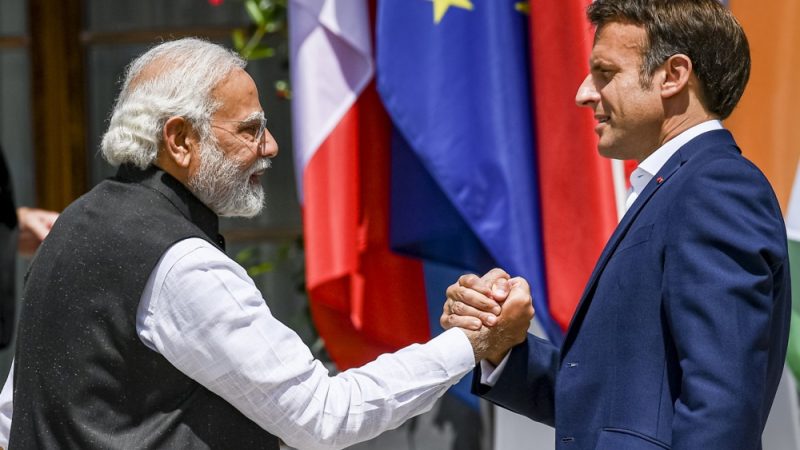
The two nations are celebrating the 25th anniversary of their Indo-French strategic relationship and are expected to offer a roadmap for the subsequent 25 years of bilateral collaboration during Modi’s visit this week as a guest of honour during France’s national day celebrations.
Since Emmanuel Macron became president of France in 2017, Modi has travelled to France four times, and in 2018, Macron was recognised with a state visit to New Delhi.
Governmental representatives from both countries have emphasised the beneficial relationships and collaboration they have experienced in respect to nuclear power, space technology, and climate change.
Prior to the visit, Modi told the French newspaper Les Echos that bilateral trade has increased by double over the previous nine years and that Macron’s “thinking really matches ours.”
According to Modi, India and France “are naturally compatible,” and India regards France as one of its top international allies.
“This closeness is not limited to just the leaders of two countries, it is, in fact, a reflection of the unwavering friendship between India and France,” Modi said on Thursday night to a cheering audience of Indians residing in France.
A few weeks prior to the visit, Modi received the extraordinary pleasure of attending a state banquet at the White House in Washington, a city he had previously been forbidden from visiting.
Strategic Collaboration
The pricing and other details are still being worked out, but the Indian government said on Thursday that it will purchase three Scorpene-class military submarines and 26 Rafale Marine fighter planes from France’s Dassault and Naval Group.
One of the major purchasers of French weapons is New Delhi, and in 2015, Modi announced a contract for 36 Rafale fighter jets, which at the time cost €4 billion.
According to an Elysée source, Paris and New Delhi plan to unveil new investment and partnership initiatives in the transportation, energy, and space sectors on Friday without going into specifics about the companies involved.
While the French energy giant EDF has been negotiating the sale of six nuclear reactors to India for years, the French rail business Alstom has already sold trains to public transport systems in India.
The visit and the new defence agreements come as Paris strengthens its diplomatic and business connections with India in an effort to entice the Asian behemoth away from Russia, which is currently its major arms supplier.
While emerging as one of the top consumers of discounted Russian oil, New Delhi, which has traditionally sought to strike a balance between its connections with Moscow and the West, has so far refrained from denouncing Russian President Vladimir Putin’s invasion of Ukraine.
Garima Mohan, Senior Fellow in the Indo-Pacific Programme of the German Marshall Fund (GMFUS), told EURACTIV that France has been India’s most crucial partner in its efforts to diversify its weapons procurements and lessen reliance on Russia.
In response, France “has also invested a lot of political will and time in the India relationship, much more so than its European counterparts,” the author continued.
Western democracies are courting Modi and India as a counterweight to China in Asia, despite disagreements over the conflict in Ukraine and hostilities on human rights in India.
India is a major Indo-Pacific partner for France on issues of security, particularly maritime security in the Indian Ocean, combating climate change, and delivering sustainable infrastructure, according to Mohan. India is also central to the French Indo-Pacific strategy.
France has long been one of the few EU members with sizable naval assets in the area, but since US President Joe Biden identified China as a top global security issue, pressure has increased on the other EU members to do more.
The EU has intensified its plan in recent years to increase its presence in the Indo-Pacific and challenge China’s growing influence in the region.
According to Mohan, “New Delhi and Paris both share the same view of the challenges from China, particularly in the maritime realm.
Overall, she told EURACTIV, “President Macron’s recent trip to Beijing did raise some concerns in New Delhi, but there is deep political trust and enough agreement between India and Paris on China-related issues that this did not cause any major issues.”
Human rights
However, few observers anticipate Macron to bring up human rights issues with Modi, albeit in private.
A resolution from the European Parliament on July 10 served as a reminder of Modi’s contentious leadership style and the Hindu nationalist agenda that have been condemned both domestically and internationally on the eve of the visit.
The resolution urged New Delhi to put an end to the bloodshed in the troubled Manipur state of the nation and to defend minorities there.
According to the parliament, fighting between the predominantly Christian Kuki tribe and the majority Meitei tribe has resulted in over 1,700 homes being destroyed, 50,000 people being displaced, and at least 120 fatalities.
It questioned the “nationalistic rhetoric” used by the state government in the area, which is headed by Modi’s BJP.
Since his first resounding political victory in 2014, he has also been under fire from rights organisations for escalating violence and prejudice against the nation’s Muslims as well as for suppressing the media.
Modi’s actions on Bastille Day in France were “an affront not only to India’s minority communities, journalists, and human rights defenders, but also to India as a democracy,” according to Pierre Larrouturou, the text’s primary negotiator.
However, according to French media, a protest against Modi only attracted a small number of attendees in central Paris on Thursday.

















